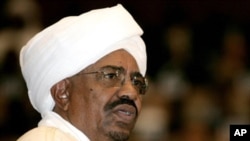A senior member of Sudan’s governing National Congress Party (NCP) has told VOA an agreement with the Sudan People’s Liberation Movement (SPLM) over outstanding “oil issues” ahead of the next month’s referendum shows his party’s commitment towards the full implementation of the Comprehensive Peace Agreement (CPA).
Rabie Abdelati Obeid said the agreement is also an indication that a solution could soon be found to resolve disputes surrounding the oil-rich Abyei region.
“The two parties agreed that the oil should be continued from south to north and to be transported all through the period after the referendum till 19th of July 2011, that, together, they (SPLM and NCP) should guarantee the protection of bodies and companies, as well as employees, and that everything should continue as it is,” said Obeid.
“This is to guarantee the flow of oil and the protection of personnel working there, and companies, and also to guarantee the revenue will come to the south because it will be the only revenue that south will retain, only in case of secession.”
Ali Osman Mohammed Taha, Sudan’s second vice president, and members of the NCP, reached agreement Wednesday with senior officials of the SPLM over concerns about oil production after the referendum.
Obeid said the agreement will ensure that oil production is not disturbed regardless of the outcome of the 9th January referendum.
He said the oil agreement also forms part of the CPA, which he said guarantees stability.
“I think this will be very good to resolve the pending points regarding Abyei, as well as citizenship, and the rest which are left, including the demarcation (of borders) between south and north.”
Obeid said the NCP is satisfied with the agreement which, in his words, made no change in the CPA.
“It is also typical to what has already been signed in the CPA about the production of oil in this area, which is under the borders of 1956,” he said.
Meanwhile, thousands of people marched in southern Sudan Thursday to show support for next month's referendum on southern independence.
Demonstrators marched through the regional capital, Juba, singing songs and chanting slogans calling for separation from the rest of Sudan. Southerners have been holding monthly marches to show their support for the poll.





